Deoband Reject Sahaba Sayings
Bismillahirrahmanirraheem, Alhamdulillah this is another one of the wonderful articles from the Magazines of Shaikh Muhammad Zubair Sadiq Abadi (One of the authors of Shaikh Zubair Ali Zai’s magazine “Al Hadeeth”). The honours of translating this article is done by brother Raza hasan. May Allaah reward him immensely for this crucial work. This article contains proof of how the Deobandis Reject the Saying of Sahaba.
The hadeeth which does not contain in it the mention of the Prophet (sallallaahu alayhi wasallam) and is only the saying or act of a Sahaabi is called Mawqoof. Some people claim for all the Ahlul Hadeeth that they do not accept the Mawqoofaat of Sahaabah. In this short and succinct article, we have proven from the books and passages of Deoband that they themselves do not consider the Mawqoofaat of Sahaba to be Hujjah and when the saying or action of a Sahabi goes against these Taqleedis, then they are the first ones to reject it.
Muhammad Imraan Safdar Deobandi, the beloved of Ilyas Ghumman, writes:
“The Raafidis declared the Eemaan of Sahaabah to be unreliable while the minor Raafidis (Ghayr Muqallideen) refused to accept the sayings and actions of Sahaabah to be Hujjah. I seek Allaah’s refuge from the wickedness of Ghayr Muqallideen” [Qaaflah Haqq, Vol. 1 Shumarah 2, P. 44]

Dear Readers! Now if you read the following sayings of Deobandi Muqallideen then according to the Deobandi Usool, you will end up saying: “I seek Allaah’s refuge from the wickedness of Deobandis”!
1- Sarfaraz Khan Safdar Deobandi writes:
“There is no doubt in the fact that the saying of a Sahaabi especially the saying of a relied upon personality in the presence of prophet-hood like Abdullah bin Mas’ood is a heavy proof in its place, but in light of the principles of Hadeeth, the difference that is established between a Marfoo and Mawqoof hadeeth can not as well be avoided. The status that a Marfoo hadeeth of Hadhrat Muhammad (sallallaahu alayhi wasallam) holds is certainly not of the saying of a Sahaabi, even if it is Saheeh.” [Raah-e-Sunnat (P. 114)]

2- The “Shaykh ul-Hadeeth” and the “Shaykh ul-Hind” of Deobandiyah, Mahmood ul-Hasan Deobandi said:
“As for the act of a Sahaabi, then it is not a Hujjah” [Taqaareer Shaykh ul-Hind P. 30]
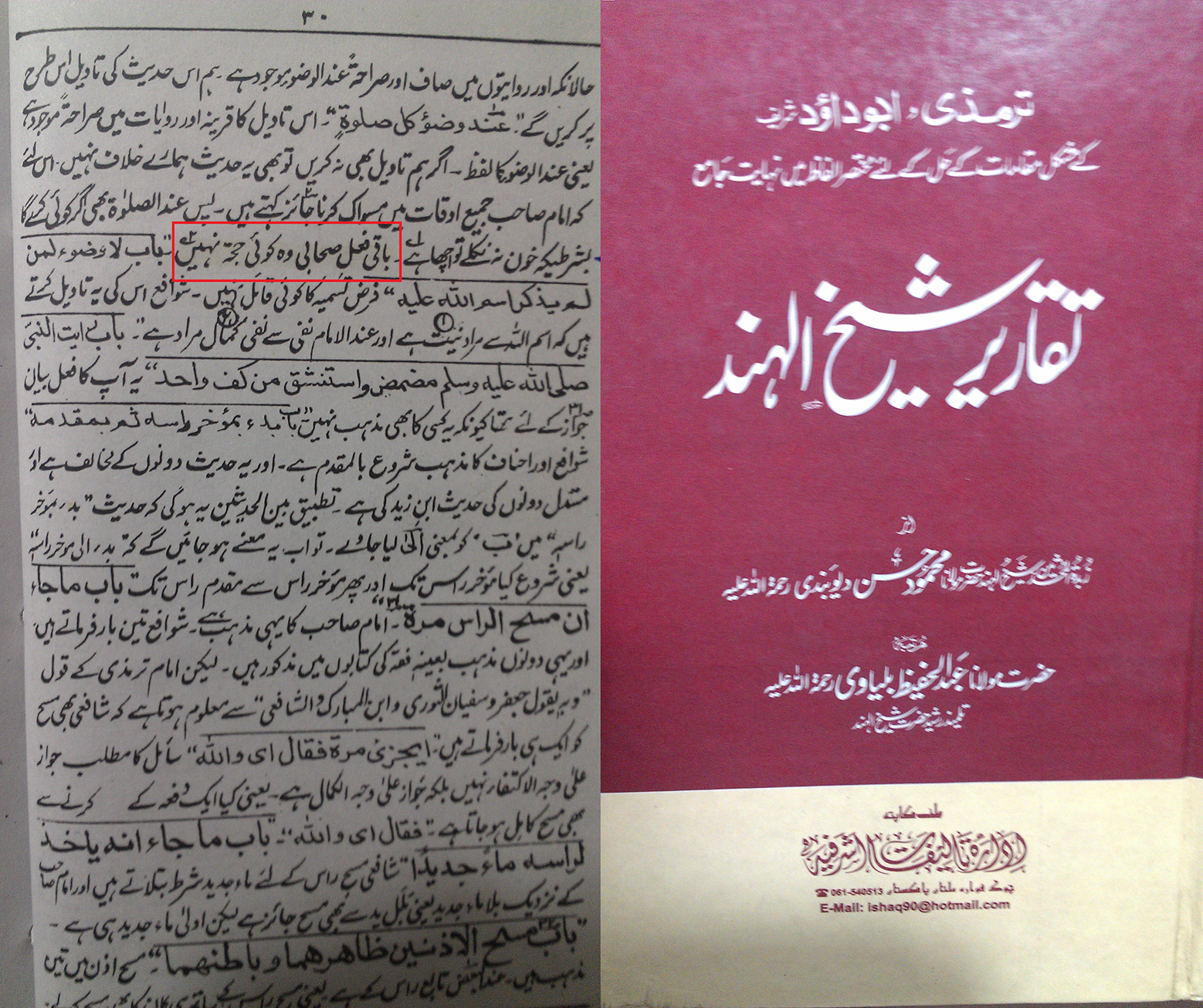
3- At another place, he said:
“This one saying of a Sahaabi cannot be a Hujjah for the Hanafiyyah” [Taqaareer Shaykh ul-Hind P. 43]
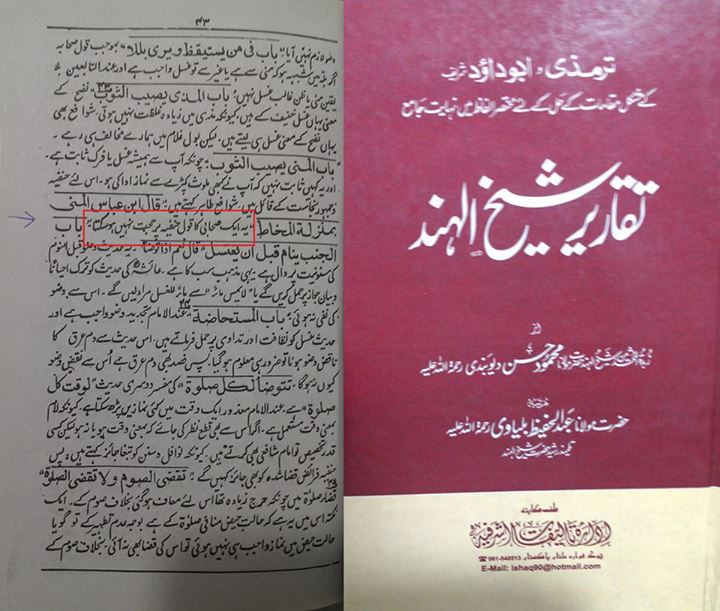
4- Muhammad Anwar Shaah Kaashmiree, the previous “Shaykh ul-Hadeeth” of Daar ul-Uloom Deoband, while giving a testimony to the court in the Muqaddimah Bahaawalpoor said that the saying of a Sahaabi is not a Hujjah as is the saying of the Prophet. [See, Rawdaad Muqaddimah Mirzaa’eeyyah Bahaawalpoor Vol. 1 P. 445]
5- Khaleel Ahmed Sahaaranpoori Deobandi writes:
“وهو مذهب صحابيلا يقوم به حجة علي أحد”
“And it is the Madhab of a Sahaabi which is not Hujjah for anyone” [Bazl al-Majhood 5/39 H. 821]
6- The Imaam of Aal-e-Deoband, Mulla Ali Qaari al-Hanafi writes:
“وهو مذهب صحابيلا يقوم به حجة علي أحد”
“And it is the Madhab of a Sahaabi which is not Hujjah for anyone” [Mirqaat al-Mafaateeh Sharh Mishkaat al-Masaabeeh (2/549 H. 823)]
If someone says that the saying of a Sahaabi is not Hujjah in our Madhab, then for such a person the beloved of Ilyaas Ghumman, Abdul Ghani Taariq Ludhiyaanwi Deobandi writes:
“آئندہ ایسی بات زبان سے نکالی تو زبان کھینچ کر کتے کے سامنے ڈالدونگا۔”
“If you ever utter such a thing from your tongue, then I will pull out your tongue and feed it to the dogs” [Shaadi ki pehli dus raatein P. 9]
7- Zafar Ahmed Thaanvi Deobandi said:
“ولا حجة في قول الصحابي في معارضة المرفوع” إلخ
“The saying of a Sahaabi is not Hujjah in contradiction to the Marfoo” [I’laa us-Sunan (1/463 H. 432)]

8- Sayyidunah Abu Hurayrah (radiallah anhu) used to read Qunoot in the Fajr prayer. While commenting on this fact, the “Shaykh ul-Hadeeth” of Deobandis, Muhammad Taqi Uthmaani said:
“This narration is Mawqoof, thus there is no Hujjah in it” [Dars-e-Tirmidhi 2/169]
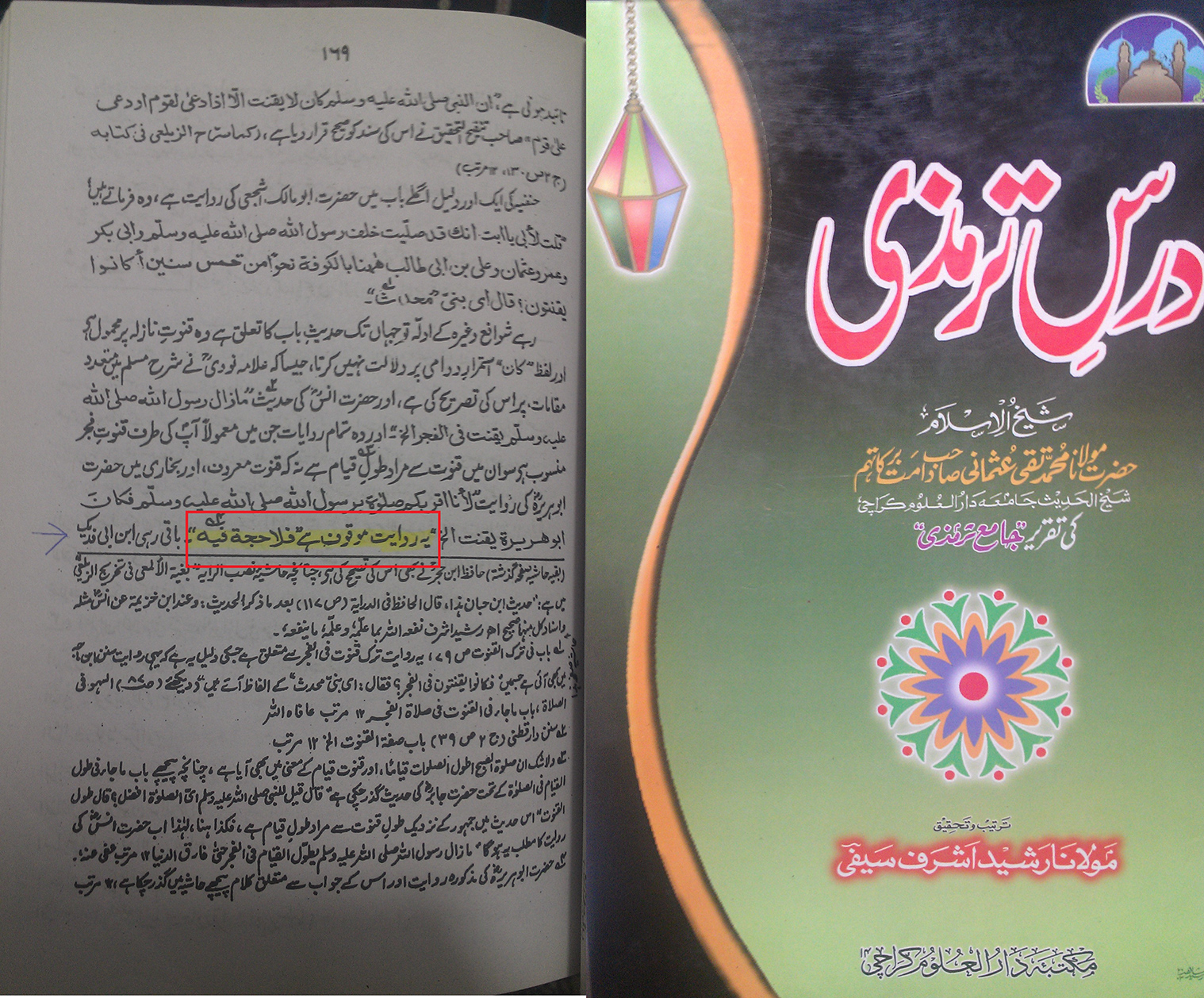
9- Muhammad Taqi Uthmaani Deobandi said:
“From the side of Hanafiyyah, the answer to that was given as such that there is no approval of him (sallallaahu alayhi wasallam) proven on this incident, and without his approval, in contrast to the other ahaadeeth, the action of a Sahaabi cannot be a Hujjah” [Dars-e-Tirmidhi 1/319]
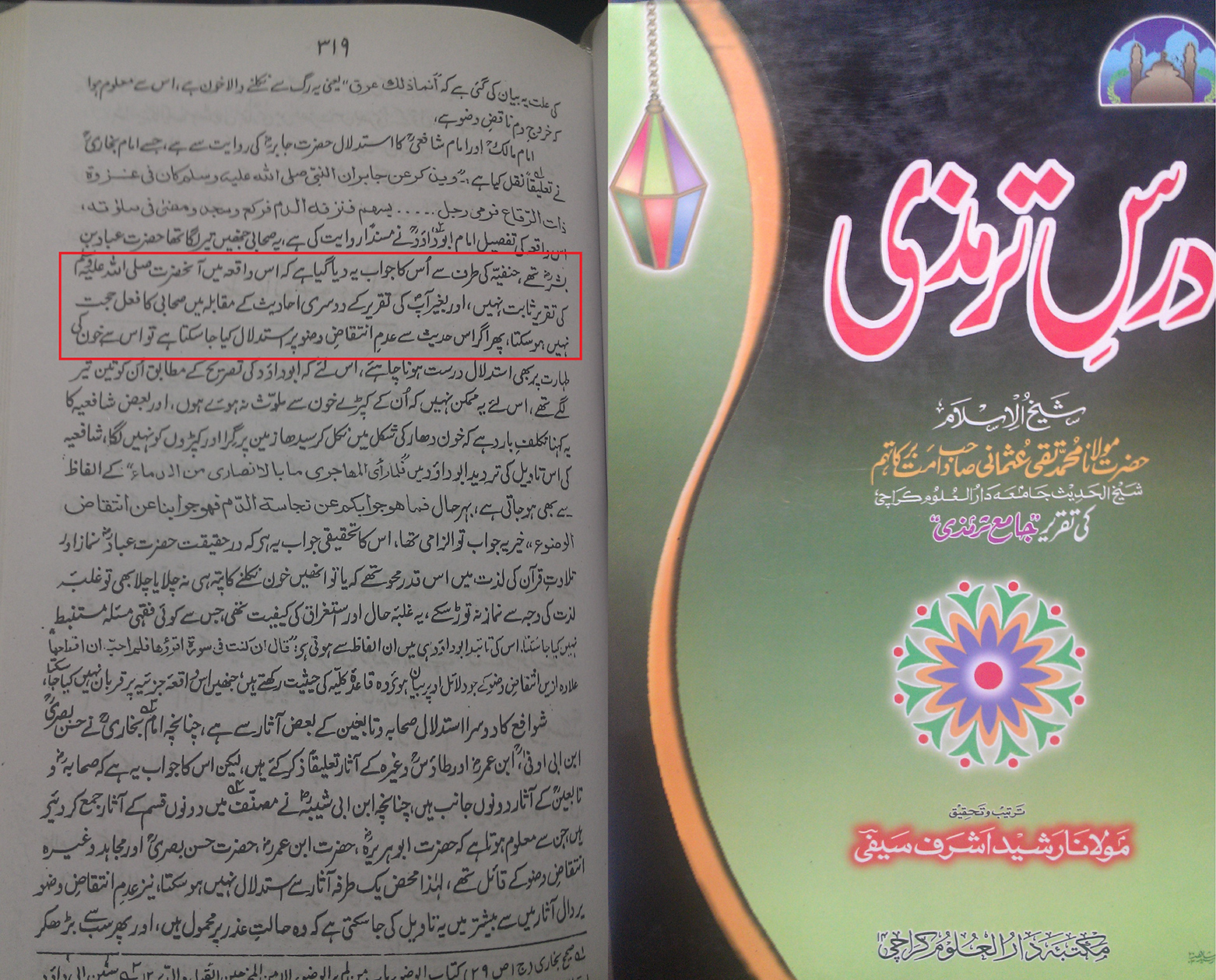
10- Muhammad Taqi Uthmaani further said:
“لہٰذا اس کا صحیح جواب یہ ہے کہ یہ حضرت ابن عمر کا اپنا عمل اور اجتہاد ہے، احادیث مرفوعہ میں اس تفریق کی کوئی بنیاد مروی نہیں، نیز صحابی کا اجتہاد حجت نہیں، خاص طور سے جبکہ اس کے بالمقابل دوسرے صحابہ کے آثار اس کے خلاف موجود ہوں۔”
“Therefore, the correct answer to this is that it is the personal act and Ijtihaad of Ibn Umar, there is not differentiation in it narrated from the Marfoo ahaadeeth; moreover, the Ijtihaad of a Sahaabi is not Hujjah, especially when there are the other Athaar of Sahaabah present in opposition to it” [Dars-e-Tirmidhi 1/191]
11- Muhammad Taqi Uthmaani said:
“So first of all, this is the personal Ijtihaad of Abu Hurayrah which is not Hujjah against the Marfoo ahaadeeth” [Dars-e-Tirmidhi 2/84]

12- Muhammad Taqi Uthmaani Deobandi further said:
“Now there remains only the athar of Abu Bakr Siddeeq, and the answer to this is that, firstly, it is afflicted with a severe Idtiraab, and secondly even if it is accepted to be authentic as per the chain, still it can be the Ijtihaad of a Sahaabi, which is not Hujjah against the Marfoo Hadeeth” [Dars-e-Tirmidhi 1/283]

Whereas, Ismaa’eel Jhanghwi al-Deobandi said, while taunting on Ahl al-Hadeeth:
“Now have a look at a new reference and imagine the vast understanding of a Wahhaabi. This, I have in my hand, Fataawa Barkaatiyah, on Page 36 of which it says: ‘Even if the act of Abdullah bin Mas’ood is proven with an authentic chain, it is still not a proof for us against the act of the Prophet!’Look, read, and pay attention at this passage again and again as to whether it seeks to give preference to one’s own intellect and understanding over the Sahaabah or not!?” [Tuhfah Ahl-e-Hadeeth, Part 3 P. 49]

We say to Ismaa’eel Jhanghwi and their partner Deobandis to read, again and again, the passage of Taqi Uthmaani and clarify the difference between these two passages!
13- Mufti Jameel Ahmed Nazeeri Deobandi writes:
“ہاں بعض صحابہ کرام سے ایک رکعت وتر پڑھنے کی بھی روایتیں ملتی ہیں مگر یہ ان کا اپنا اجتہاد تھا۔ جو احادیثِ مرفوعہ کثیرہ کے مقابلے میں حجت نہیں۔”
“Yes, we do find some narrations from some of the Sahaabah concerning praying one rak’ah witr, but this was their personal Ijtihaad which is not Hujjah against the numerous Marfoo ahaadeeth” [Rasool-e-Akram (sallallaahu alayhi wasallam) ka tareeqah Namaaz (P. 259)]
If the same athaar were in accordance to their Taqleedi Madhab then they would have said that the Sahaabah Karaam could not have offered an important Ibaadah like Salaah from their own intellect, therefore these athaar are in the ruling of being Marfoo, as these people say concerning some un-proven athaar in the issue of wiping over the neck!
14- Muhammad Taqi Uthmaani said:
“As for the second route then that is also Saheeh, but even this does not establish a clear Marfoo proof for the Shaafi’eeyyah and others, because that is the personal Ijtihaad of Hadhrat Ubaadah, i.e. he considered the hadeeth ‘there is no prayer for the who does not recite’ to be general for both Imaam and Muqtadi and extracted the ruling from this hadeeth that the recitation is obligatory even for the Muqtadi, but this extraction of his can not be Hujjah against the Marfoo ahaadeeth” [Dars-e-Tirmidhi 2/75]

15- The “Imaam” of Deobandis, Sarfaraz Khan Safdar Karmangi Gakhrawi wrote:
“Whether Hadhrat Ubaadah bin as-Saamit understood it correctly or incorrectly, the truth is that Hadhrat Ubaadah was of the opinion to recite Surah Faatihah behind the Imaam and this was his research and this was his Maslak and Madhab, but the understanding of a Sahaabi and the Mawqoof of a Sahaabi is not Hujjah, especially against the Noble Qur’aan, the authentic ahaadeeth, and the athaar of Jumhoor Sahaabah Karaam…” [Ahsan ul-Kalaam (2/156)]
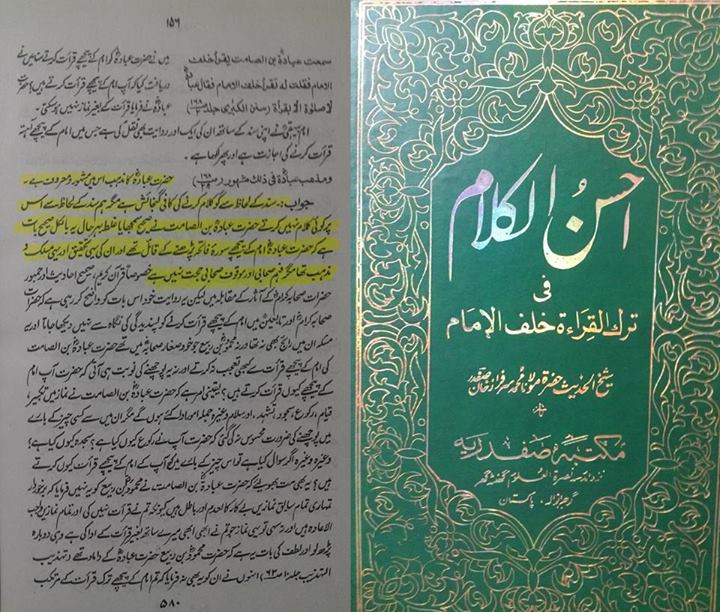
16- At another place, Sarfaraaz Safdar wrote:
“Certainly Hadhrat Aa’ishah was not of the opinion that dead can hear, but we have read the kalima (i.e. laa ilaaha illallaah…) of the Prophet (sallallaahu alayhi wasallam) and he said that the dead can hear, so should we accept his saying or the saying of Aa’ishah?” [Khazaain as-Sunan (3/64)]
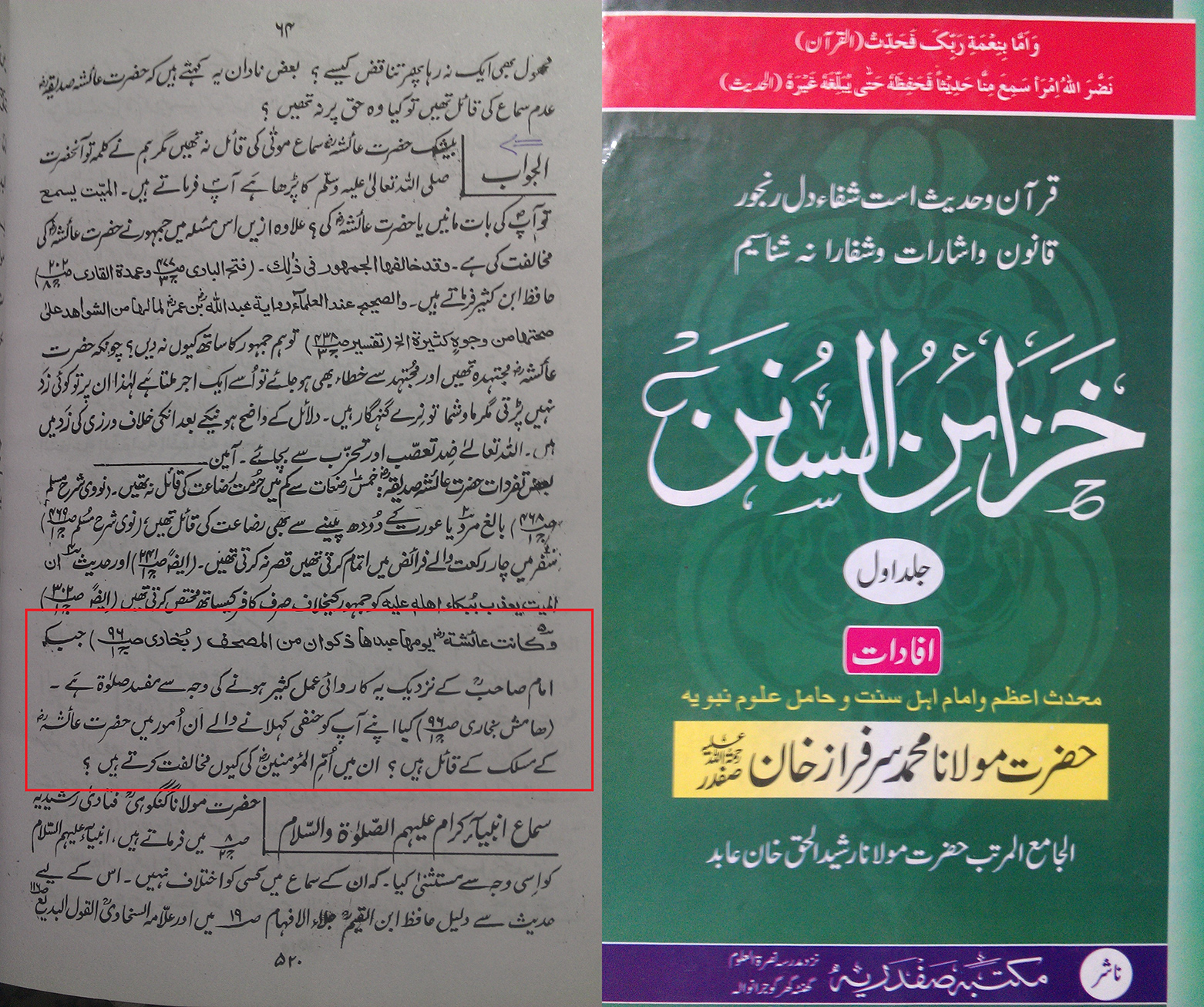
17- Faqeerullaah Deobandi wrote:
“ثانیا: اس لئے کہ یہ حضرت ابو ہریرہ رضی اللہ عنہ کا اپنا قول اور فتوی ہے۔ جو مدرک بالقیاس ہے، مرفوع حدیث نہیں ہے، اور صحابی کا وہ قول اور فتوی جو مدرک بالقیاس ہو وہ بالاتفاق حجت نہیں ہے،”
“Thirdly because this is the personal saying and Fatwa of Hadhrat Abu Hurayrah radiallah anhu which is achieved through Qiyaas and is not a Marfoo hadeeth; and the saying or Fatwa of a Sahaabi which is achieved through Qiyaas is not Hujjah with agreement.” [Khaatimah al-Kalaam P. 550]
18- Master Ameen Okaarvi wrote about Sayyidunah Abdullah az-Zubayr (radiallah anhu):
“The odd rulings of Hadhrat Abdullah bin az-Zubayr are not accepted by the Ahl us-Sunnah wal Jama’ah as compared to the other Sahaabah, for example: He was of the opinion to give Adhaan and Iqaamah even for the prayers of Eedayn, and he was also of the opinion to pray while leaving the hands (on the sides)” [Tajalliyaat-e-Safdar (2/299)]

19- Sarfaraaz Khaan Safdar wrote:
“Mawqoof is not any Hujjah against the Marfoo ahaadeeth” [Khazaain as-Sunan (1/179)]

20- Imaam Bukhaari (rahimahullah) narrated the sayings of Sayyidunah Anas (radiallah anhu), Hasan Basri, and Qataadah that there is no Tashahhud after the prostration of forgetfulness [See, Saheeh al-Bukhaari (1/163)]. So while rejecting this, Sarfaraaz Safdar Deobandi said:
“But this extraction of Imaam Bukhaari is weak because these are Mawqoof narrations, while on the contrary there are clear, authentic and Marfoo narrations; what is the use of Mawqoof narrations against them?” [Khazaain as-Sunan (2/143)]
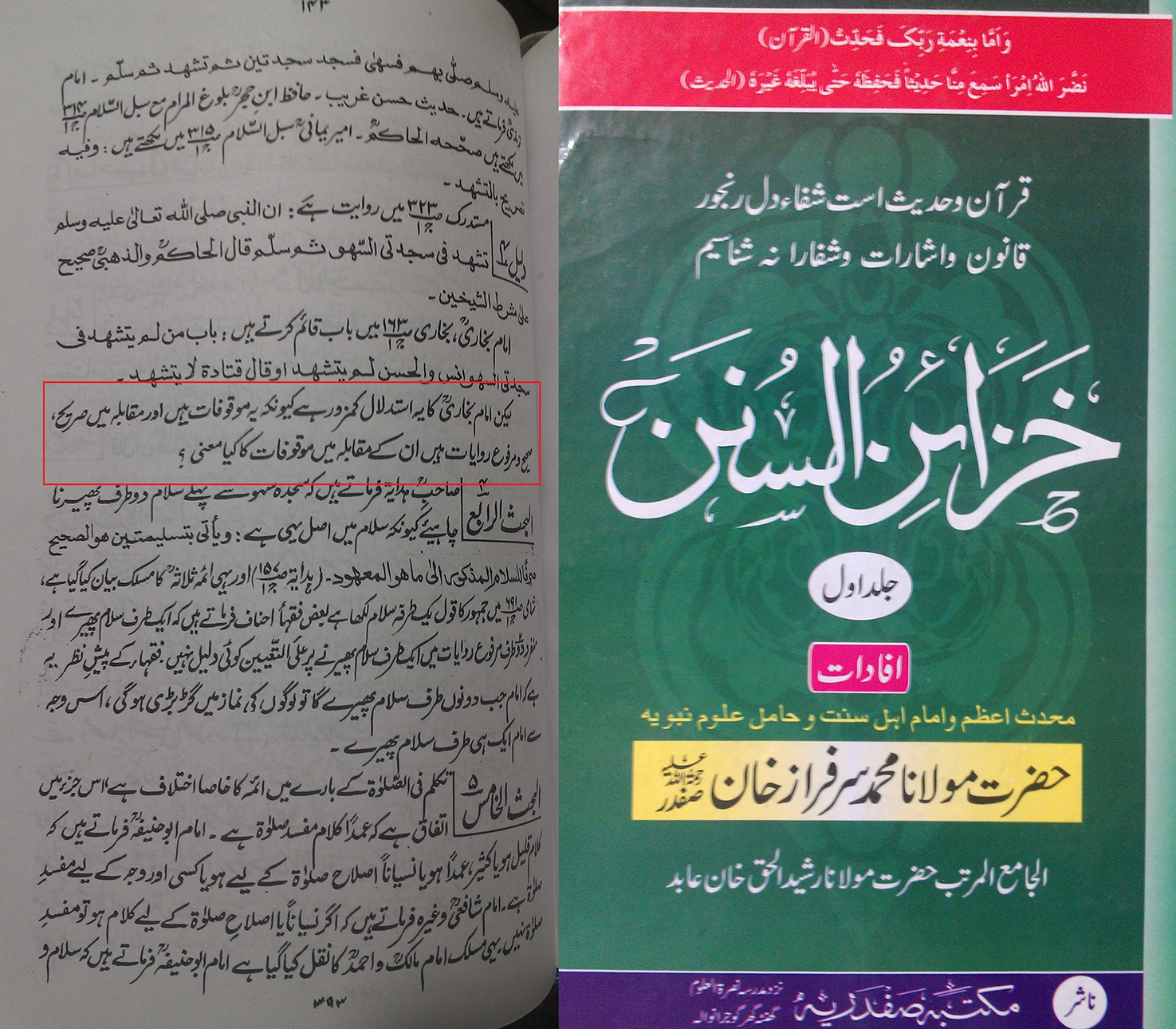
21- Abdul Maajid Dariyaabaadee al-Deobandi, the Khaleefah of Ashraf Ali Thaanvi, wrote:
“زلات اور خطا اجتہادی سے صحابہ تک خالی نہیں۔ چہ جائیکہ بزرگ جو ان سے بہر صورت کم تر ہیں۔”
“Even the Sahaabah are not free from errors and mistakes, let alone the pious personalities who are, anyhow, inferior from them” [Hakeem ul-Ummat (P. 275)]
22- Abdul Qayyoom Haqqaani Deobandi wrote:
“The most reasonable and correct answer is that this was the personal act and the person Ijtihaad of Hadhrat Ibn Umar….. After all the Ijtihaad of a Sahaabi is not even Hujjah especially when there are the Athaar of other Sahaabah on the contrary” [Tozeeh us-Sunan (1/405)]
23- There is narration in Sunan Abu Dawood (1/26 H. 198) that a Sahaabi started his prayer and while in prayer he was shot with an arrow which made his blood flow but he continued his prayer, if the streaming of blood had been one of the invalidators of wudoo then he would not have continued praying his Salaat. After narrating this act of the Sahaabi, Sarfaraaz Khaan Safdar did not consider it to be a Hujjah, rather on the contrary he presented the saying of one of his own akaabireen in its place, saying:
“مولانا سہارنپوری بذل المجہود ج 1 ص 122 میں لکھتے ہیں کہ یہ کاروائی از خود تھی۔ نبی علیہ الصلوۃ والسلام کا اس پر عمل نہ تھا۔ نہ آپ کو علم تھا، اور نہ آپ نے یہ حکم دیا تھا۔”
“Maulaana Sahaaranpoori writes in Vol. 1 P. 122 of Bazl al-Majhood that this proceeding was on his own, the Prophet (sallallaahu alayhi wasallam) did not act upon this; neither was he aware of this nor did he give him the permission to do this” [Khazaain as-Sunan (1/182)]
24- Ashraf Ali Thaanvi said:
“The Madhab of Hadhrat Anas was (in favor of having) the second Jama’ah (in a Masjid)” [Malfoozaat Hakeem ul-Ummat 26/201]
Right after this saying, instead of accepting the act of Sayyidunah Anas (radiallah anhu) to be Hujjah, Thaanvi wrote:
“Now since the Ijmaa has taken place against this, that’s why the first action will be elevated” [Same (P. 201)]

If the act of a Sahaabi was Hujjah according to the Deobandis, then they would not have cared about this self-proclaimed Ijmaa.
25- Zakariyyah Tableeghi Deobandi said:
“There has never come any jitteriness in mind about the fact that some Sahaabah Karaam radiallah anhum have made some big mistakes, whereas the occurrence of such mistakes from the great Shaykhs is even more far-fetched and the biggest of Shaykhs can never be superior to the smallest of Sahaabah…” [Sharee’at wa Tareeqat ka Talaazum P. 11 & Sawaanih… Muhammad Zakariyyah P. 278]

26- Sarfaraaz Safdar Hayaati Deobandi, while arguing against the Mamaati Deobandis, named a heading: “Some odd views of Aa’ishah Siddeeqah” then under this heading, he said:
“’And Aa’ishah used to be led by her slave Zakwaan from the Mus-haf’ (Bukhaari Vol. 1 P. 96) whereas according to Imaam Sahab (i.e. Imaam Abu Haneefah) this act invalidates the Salaah because it involves a lot of movements (Footnotes of Bukhaari Vol. 1 P. 96). Will those, who call themselves Hanafi, follow the opinion of Hadhrat Aa’ishah in these issues? Why do you oppose Umm ul-Mu’mineen in these issues?” [Khazaain as-Sunan 3/64]

What Sarfaraaz Safdar Hayaati Deobandi wants to say to the Mamaati Deobandis is that just how we both groups have opposed some Athaar of Aa’ishah (radiallah anha) but that did not make any difference to our Hanafiyyat, likewise, opposing her in the issue of Samaa Mauta will not as well make any difference to our Hanafiyyat!!
27- Master Ameen Okaarvi claimed based on a fabricated narration attributed to Hasan Al-Basri that “there is the consensus of all the Muslims that witr is three rak’ahs, in which the salaam is said only at the end” [Tajalliyaat Safdar (2/564)]
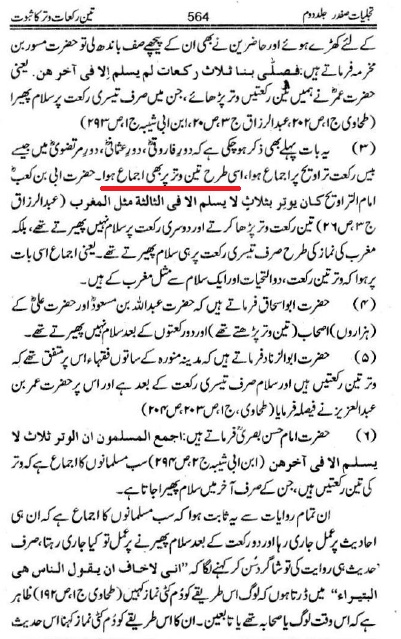
But at another place, he himself wrote:
“Hadhrat Sa’d offered one rak’ah witr…” [Tajalliyaat Safdar (2/571)]

At another place, he wrote:
“Anyway, the summary of this is that Hadhrat Ameer Mu’aawiyah prayed one rak’ah witr” [Tajalliyaat Safdar (2/572)]
Instead of accepting one rak’ah witr by accepting the act of Sahaabah Karaam to be Hujjah, Master Okaarvi said about Ameer Mu’aawiyah (radiallah anhu) while rejecting the one rak’ah of witr that:
“He (i.e. Mu’aawiyah radiallah anhu) does not have any clear Hadeeth to prove that one rak’ah witr remained” [Tajalliyaat-e-Safdar (2/572)]

And further he wrote:
“One Rak’ah witr is not permissible” [Tajalliyaat-e-Safdar (2/573)]
28- According to Sayyidunah Abu Hurayrah (radiallah anhu), only the recitation of Surah Faatihah is obligatory in Salaah as this Fatwa of his is present in Saheeh al-Bukhaari (1/106 H. 77) and Saheeh Muslim (1/170 H. 396). Although the Imaam of Deobandiyah, Sarfaraz Khaan, could not dare to criticize the authenticity of this narration, but instead of accepting it, he rejected it with the following words:
“The narration of Hadhrat Abu Hurayrah that Mubaarakpooree sahab has presented for the sufficiency of Surah Faatihah only, cannot be any beneficial for his purpose, because this is Mawqoof upon Hadhrat Abu Hurayrah and these words are not narrated in any Marfoo and Saheeh narration (See, Fath ul-Mulhim Vol. 2 P. 31 etc)”
[Ahsan ul-Kalaam (2/32), second edition (2/35)]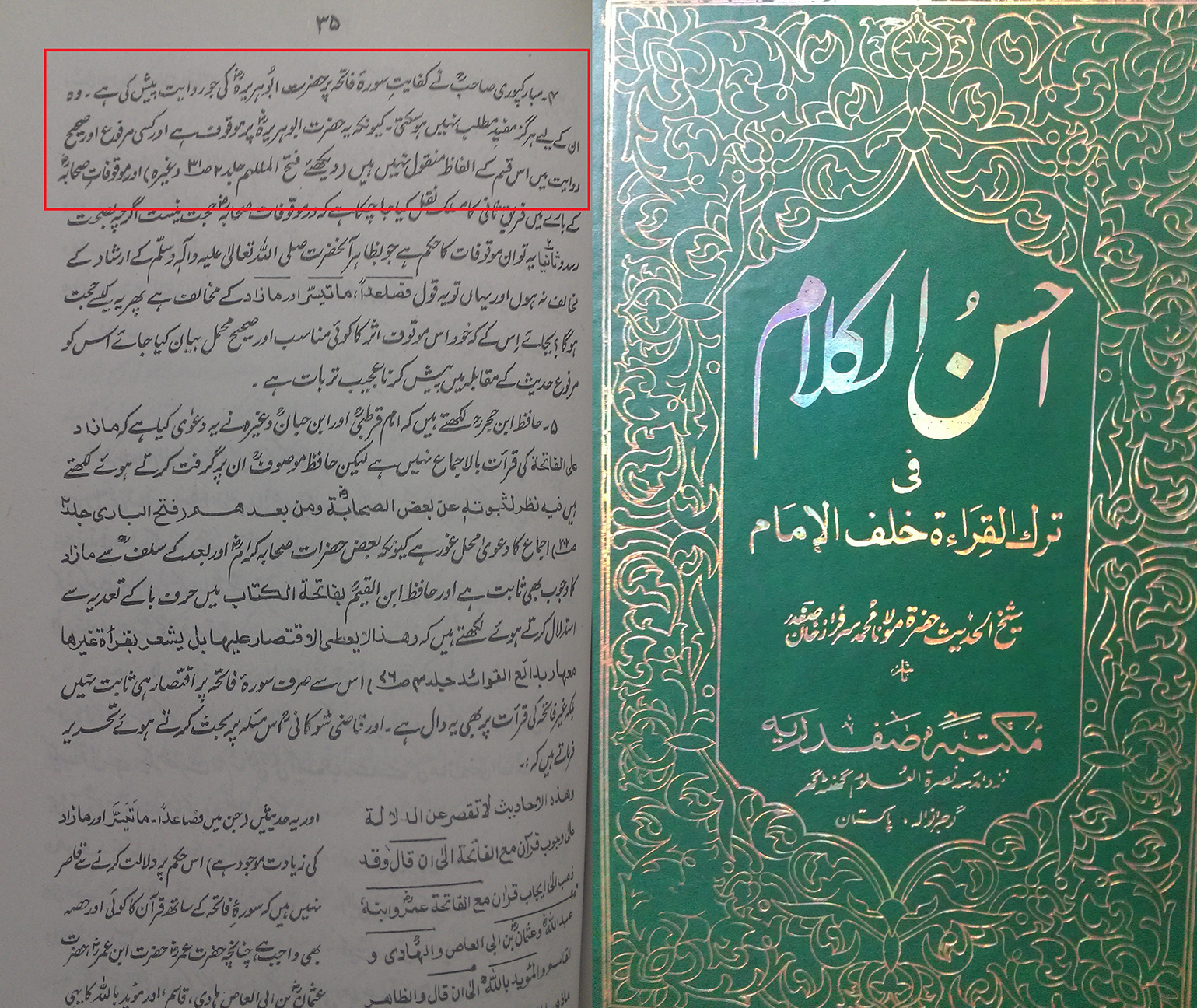
Dear Readers! Leave aside considering the Athaar of Sahaabah to be Hujjah; the Deobandis did not even hesitate to insult the Sahaabah. Hence, the Shaykh ul-Hind of Deobandis, Mahmood ul-Hasan Deobandi said:
“حنفیہ کہتے ہیں کہ فاطمہ کو سکنیٰ اس لئے نہ دلوایا گیا کہ وہ زبان دراز تھیں۔”
“According to the Hanafiyyah, Faatimah was not given housing because she was long-tongued/abusive” [Taqaareer Shaykh ul-Hind (P. 133)]
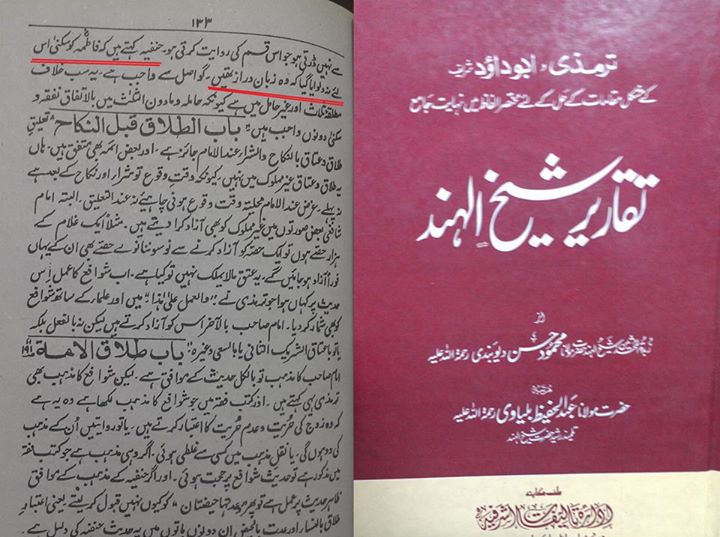
Another Deobandi said about Sayyidah Faatimah bint Qays (radiallah anha) that: “(خدا جانے سچ کہتی ہے یا جھوٹ بولتی ہے)”
“(God knows whether she speaks the truth or lie)” [Tarjumaan-e-Ahnaaf (P. 199)]
29- The son of Sarfaraaz Safdar, Abdul Quddoos Khaan Qaaran said:
“Among the Ahnaaf, Eesaa bin Abaan (who was the contemporary of Imaam Shaafi’ee) has said that the hadeeth of Musarrah is only narrated from Hadhrat Abu Hurayrah and since Hadhrat Abu Hurayrah was not a Faqeeh, therefore, this narration of his is abandoned because of being against the Qiyaas, and this is the narration from whose reference some people have written this in the books of Usool such as Noor al-Anwaar P. 83, and Usool Shaashi P. 76 etc, but this view is not of the Jumhoor Ahnaaf, rather only that of Eesaa bin Abaan…” [Khazaain as-Sunan Vol. 2 P. 107, Authored by Abdul Quddoos Khaan]

Let alone considering the saying and act of Sahaabah to be Hujjah, here the Akaabireen of Aal-e-Deoband have instead rejected the hadeeth of Sayyidunah Abu Hurayrah (radiallah anhu) by declaring him to be Ghayr Faqeeh and have preferred their self-made Qiyaas!
This is such a huge insult that it was also felt and realized by some Deobandis. Hence, Anwar Shaah Kaashmiree said:
“Declaring Hadhrat Abu Hurayrah to be Ghair Faqeeh and then saying that the narration of a Ghayr Faqeeh is not to be trusted, this is something which should be taken out from the books” [Al-Urf ash-Shazi P. 394 with reference from Khazaain as-Sunan 2/108 by Abdul Quddoos Khaan]

However, unfortunately, this saying of Kaashmiree sahab is still not followed and acted upon. For the information of Deobandis we want to say that Haafidh Thana’ullaah Zaahidi (hafidhahullah) has written comprehensive footnotes of Noor ul-Anwaar. In P. 245-246 of the Third Volume of this book, he has proven with reference from 18 Fuqaha of Ahnaaf that they consider Sayyidunah Abu Hurayrah (radiallah anhu) to be Ghayr Faqeeh.
Even if, suppose, Aal-e-Deoband take out such sayings from their books, but what would they say about those Fuqaha Ahnaaf who declared Sahaabah Karaam to be Ghayr Faqeeh? Because if an Ahl al-Hadeeth had said such a thing then the Aal-e-Deoband would have described him with attributes like Shi’aa, Raafidi and what not!?
30- Sa’eed Ahmed Paalanpoori “Muhaddith of Daarul Uloom Deoband” wrote:
“اس لئے حضرت عثمان کا خیارِ عیب کی وجہ سے غلام کے لٹانے کا فیصلہ کرنا درست نہ تھا، اگر عثمان کو حقیقتِ حال کا پتہ ہوتا تو وہ ہرگز غلام واپس لینے کا فیصلہ نہ کرتے،”
“That is why Hadhrat Uthmaan’s decision to return the slave due to Khiyaar al-Ayb was not correct. If Hadhrat Uthmaan was aware of the condition’s reality, he would never have taken the decision of returning the slave” [Adillah Kaamilah P. 128, 129]
31- The People of Deoband write concerning Sayyidunah Umar (radiallah anhu) that:
“He said that the Imaam will say four things in an inaudible voice (1) A’oodhubillah (2) Bismillaah (3) Ameen and (4) Rabbana Lakal Hamd” [Namaaz Mudallal (P. 125), Hadeeth aur Ahl-e-Hadeeth (P. 376), Rasool Akram ka Tareeqah-e-Namaaz (P. 172), and Tajalliyaat-e-Safdar (3/127)]

Since this athar of Sayyidunah Umar (radiallah anhu) is not even proven from him, therefore, it is not Hujjah for the Ahl al-Hadeeth. However, this athar is proven according to the Scholars of Deoband. In spite of that they oppose this athar because the Deobandi Imaam does not say “Rabbana Lakal Hamd” in his prayer. Hence Mufti Jameel Deobandi has written:
“رکوع مکمل کرنے کے بعد سمع اللہ لمن حمدہ کہتا ہوا سیدھا کھڑا ہو جائے۔ اگر امام ہو تو صرف اتنا ہی کہے اور مقتدی کہیں ربنا لک الحمد، اور اگر تنہا نماز پڑھ رہا ہو تو دونوں کہے۔”
“After completing his rukoo, he should stand straight while saying ‘Sami Allaahu Liman Hamidah’. If he is an Imaam then he should only say that much, and the Muqtadis will say ‘Rabbana Lakal Hamd’, and if he is praying alone then he should say both phrases.” [Rasool-e-Akram ka tareeqah Namaaz (P. 222)]
Master Ameen Okaarvi writes about “Sami Allaahu Liman Hamidah Rabbana Lakal Hamd” that:
“We reconciled between the two and said that the combination of both phrases is for the one praying alone, while the division is for the Imaam and the Muqtadi (Usool Karkhi P. 84, 85)” [Tajalliyaat-e-Safdar (6/361)]
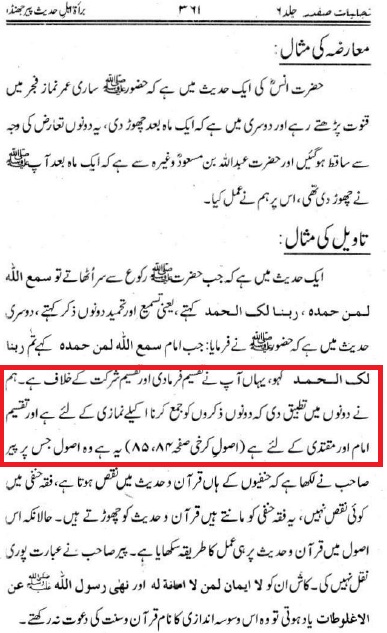
Look! Master Ameen Okaarvi has also presented this Athar of Sayyidunah Umar (radiallah anhu) at one place to support his madhab, but now in another place, he left the athar of Sayyidunah Umar behind some Karkhi!!
Now the Deobandis must explain why they don’t accept this athar of Sayyidunah Umar (radiallah anhu)?
Note: Haafidh Zubayr Alee Za’ee hafidhahullah has presented forty one (41) Authentic and Proven Athaar of Sahaabah in the Magazine: Al-Hadeeth # 30 P. 30-42 which the people of Deoband oppose.
At the end, we say that the People of Deoband or their Akaabireen have also targeted the personalities of Sahaabah Karaam (radiallah anhum) in order NOT to act upon some narrations. For example:
1- In order not to act upon the athar of Sayyidunah Anas (radiallah anhu) concerning joining the feet with the feet, Ameen Okaarvi wrote:
“حضرت انس بھی حضور ﷺ کے زمانے میں نا بالغ تھے اور پچھلی صفوں میں کھڑے ہوتے تھے”
“Hadhrat Anas was also an immature child at the time of the Prophet (sallallaahu alayhi wasallam) and he used to stand in the back rows”
He further said: “حضرت انس نے اپنے بچنے میں جو کام کیا بچوں کے ساتھ وہ روایت کیا، لیکن جب وہ بڑے ہو گئے تو صحابہ و تابعین ان کے بچنے کی عادت سے بیزار تھے”
“Hadhrat Anas only narrated what he did in his childhood with the other children. But when he grew up, the Sahaabah and Taabi’een were disgusted by his childhood practice” [Haashiah Tafheem ul-Bukhaari Alaa Saheeh Bukhaari Vol. 1 P. 370]
2- In order to reject the hadeeth of Sayyidunah Abdullah bin Umar (radiallah anhu) on raising the hands in Salaah, Ameen Okaarvi said:
“مگر امام بخاری اس باب میں مہاجر یا انصاری کی حدیث نہیں لائے۔ ایک حدیث حضرت عبد اللہ بن عمر سے لائے ہیں جو کم عمر یا صغار صحابہ میں تھے اور پچھلی صفوں میں کھڑے ہوتے تھے۔ اور ایک حضرت مالک بن الحویرث سے جو صرف بیس راتیں آپ کے پاس مسافرانہ حالت میں مقیم رہے”
“However, Imaam Bukhaari did not bring any narration from a Muhaajir or an Ansaari. He only brought one hadeeth from Abdullah bin Umar, who was a child or a minor Sahaabi and used to stand in back rows, and the other is from Hadhrat Maalik bin al-Huwayrith, who only stayed with the Prophet for twenty nights as a traveler.” [Tafheem ul-Bukhaari Vol. 1 P. 375]
3- Okaarvi further said:
“Similarly, Instead of some Badri Sahaabi, Imaam Bukhaari has proven Raf’ ul-Yadayn at nine places incomplete from a kid Ibn Umar and a traveler of twenty nights Hadhrat Maalik bin al-Huwayrith” [Tajalliyaat-e-Safdar (Vol. 7 P. 94)]
4- Concerning Sayyidunah Waa’il bin Hujr (radiallah anhu), Okaarvi said:
“Imaam Muslim jumped even further and besides these two, he found another Sahaabi, Waail bin Hujr a traveler” [Tajalliyaat-e-Safdar (7/94)]

5- Regarding Sayyidunah Anas (radiallah anhu), Badr ud-Deen Aynee Hanafi wrote:
“ويحتمل أن يكون أنس نسي في تلك الحال الكبر سنه وقد وقع هذا كثيرا…”
“And it is possible that Anas forgot in that condition because of his old age, and this has occurred a lot…” [Umdat al-Qaari (5/291 H. 131/743) Baab: Maa Yaqool Ba’d at-Takbeer]
While translating this passage, Ghulaam Rasool Sa’eedi Braylwee wrote:
“اور یہ بھی ہو سکتا ہے کہ دارقطنی کی روایت حضرت انس کے بڑھاپے کی روایت ہو اور بڑھاپے میں انسان بعض باتیں بھول جاتا ہے۔”
“And it is possible that the narration of Daaraqutni was narrated at the old-age of Hadhrat Anas, and in old-age a person forgets many things” [Sharh Saheeh Muslim (1/1154)]
If this objection was raised by a Ghayr Hanafi, then Deobandis would have declared it an insult. For example Taqi Uthmaani Deobandi said:
“آخر میں ابو بکر بن اسحاق شافعی نے بطور اعتراض یہ کہا ہے کہ جس طرح حضرت ابن مسعود کو تطبیق فی الرکوع کے نسخ کا علم نہ ہوا تھا اسی طرح رفع یدین کے مسئلہ میں بھی وہ لا علم رہے، یا ان سے سہو ہو گیا،”
“At the end, Abu Bakr bin Ishaaq Shaafi’ee said as an objection that just how Hadhrat Ibn Mas’ood was not aware of Tatbeeq fi ar-Rukoo, likewise, he remained unaware in the issue of Rafa Yadayn, or he was mistaken” [Dars-e-Tirmidhi Vol. 2 P. 31]
After narrating this objection, Taqi Uthmaani said:
“لیکن اس گستاخانہ اعتراض کی لغویت اتنی ظاہر ہے کہ جواب دینے کی ضرورت نہیں”
“But the absurdness of this insulting objection is too evident that there is no need to reply” [Dars-e-Tirmidhi (2/31)]

6- Concerning Sayyidunah Anas (radiallah anhu), the Famous Innovator, Zaahid bin Hasan al-Kawthari wrote:
“Moreover, Anas (radiallah anhu) is alone in narrating the narration about mashing the head and he narrated this narration during his old-age as he is also alone in narrating the narration of drinking camel’s urine… and Abu Haneefah’s view is that indeed despite the righteousness of Sahaabah, they are not free from lack of preservation due to being illiterate or because of old-age. Therefore, at the time of contradiction, the narration of the Faqeeh among them will be given preference over others. And similarly, to remove the doubt of mistake, the narration of others will be preferred over the narration of an old Sahaabi” [Abu Haneefah ka Aadilaanah Difaa by Abdul Quddoos Qaaran Deobandi, P. 213, Ta’neeb al-Khateeb (P. 80)]
Note:For the refutation of this insulting passage, see Al-Tankeel bima Fee Ta’neeb al-Kawthaari min al-Abaateel (1/65-69, Talee’ah al-Tankeel P. 98-106)
7- Concerning Sayyidunah Anas (radiallah anhu), Mulla Jeewan Hanafi wrote:
“غير معروف الفقه والإجتهاد”
“He is not know for Fiqh and Ijtihaad” [Futuhaat Safdar (3/382)]

Note:According to Mahmood Aalam Safdar Deobandi Hayaati, these words concerning Sayyidunah Anas (radiallah anhu) were also said by Yoonus Nu’maani Deobandi Mamaati. And while refuting Younus Nomaani al-Deobandi, Master Ameen Okarvi said:
“Then the Moulvi Sahab has said a heinous thing which even Mirza Ghulaam Ahmed Qaadiyaani (the claimant of Prophet hood) used to say that Hadhrat Anas, the Sahaabi, was neither Aadil, nor Faqeeh, nor did he have any understanding of the deen. At first, he used to say that we do not follow these narrations because it contains such and such a person, but now we know that he is actually the Munkar of Prophet’s Sahaabah. And this Yoonus Nu’maani will never say about himself that I am not Aadil or I am a Faasiq, but concerning Hadhrat Anas (radiallah anhu) he has said something which Mirza Ghulaam Ahmed Qaadiyaani used to say… And this is written by his Shaykh (Muhammad Husayn Naylawi). From Page # 135 of Nidaa-e-Haqq, we now know that this name taking of people here and there was only an excuse, in reality they are the enemies of Sahaabah (radiallah anhum). When they are the enemies of Sahaabah so now why would they follow the narrations?” [Futuhaat Safdar (3/380-381)]
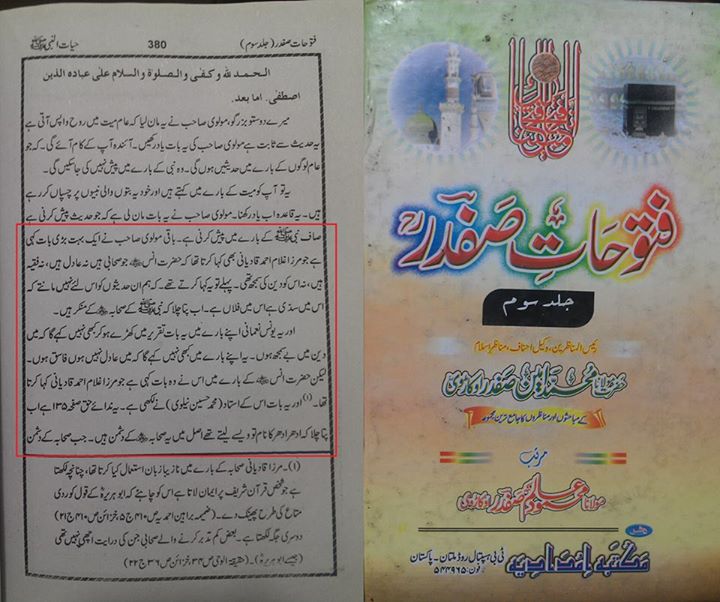
In counter response to this comment of Master Ameen Okaarvi Hayaati Deobandi, Yoonus Nu’maani Mamaati Deobandi commented:
“My Dear Friends, Brothers. In this passage, Moulvi Sahab has done a huge injustice as he attributed towards me that I said about the Sahaabi (radiallah anhu) that he is not Aadil and he was a Faasiq. (Rather) I had only quoted with reference to Noor al-Anwaar and Usool Shaashi that it is written in them: ‘He was not known for Fiqh and Ijtihaad’. Now what the Moulvi Sahab should have done is ask me for the proof and I would have showed him that: see, it is written in such and such place. But in order to enrage the people, as is the way of Liars, he instead tried to use this trick on me. If a Ghayr Muqallid had said this, it was not a problem, but I am amazed that this objection came from a man who claims to be the preacher of Hanafi Usool al-Fiqh. I only said, ‘He is not known for his Fiqh and Ijtihaad’ and if you can find that I said Hadhrat Anas (radiallah anhu) was not Aadil, but a Faasiq – if you can find these words then I am ready to confess my defeat in writing, but why do you speak such useless things? The Hanafi Usool al-Fiqh, which is accepted even according to you, contains the saying that Hadhrat Anas (radiallah anhu) is a Ghayr Ma’roof narrator in Fiqh and Ijtihaad. And if his narration goes against the Qiyaas then the Qiyaas will be given precedence. This is written in Noor al-Anwaar and Usool Shaashi.” [Futuhaat Safdar (3/382-383)]

Then after this comment of Yoonus Nu’maani, Master Ameen Okaarvi replied again, saying:
“مولوی صاحب کہتے ہیں کہ میں نے جو کہا ہے وہ نور الانوار اور اصول شاشی میں ہے، اور کوئی غیر مقلد کہتا تو اور بات تھی۔ مولوی صاحب آپ کہتے ہیں کہ یہ مسلمہ بات ہے، یہ جھوٹ ہے۔ فقہ حنفیہ نے اس کا رد کر دیا ہے۔ اور فقہ حنفیہ میں لکھا ہے کہ کسی مرجوح قول پر فتوی دینے والا جاہل ہے اجماع مخالف ہے۔۔۔ یہ جو قول حضرت انس رضی اللہ عنہ کے بارے میں لکھا ہے یہ قطعا راجح قول نہیں ہے۔ یہ مرجوح قول ہے۔ اور جو اس قسم کے مرجوح قول ہوا کرتے ہیں۔ احناف اس کی تردید کرتے ہیں۔”
“Moulvi Sahab says that what I said is present in Noor al-Anwaar and Usool Shaashi, and that if a Ghayr Muqallid had said this, it would have been a different thing. O Moulvi Sahab, you say that it is an accepted thing, (but) this is a Lie. The Hanafi Fiqh has rejected this. And it is written in Hanafi Fiqh that the one who gives Fatwa on a Marjooh opinion is a Jaahil and an opposer of Ijmaa…. This saying that is written concerning Hadhrat Anas radiallah anhu is not at all Raajih. This is a Marjooh saying. And these types of Marjooh sayings are rejected by Ahnaaf.” [Futuhaat Safdar (3/386)]
From this family conflict between Hayaati and Mamaati Deobandis, this saying is established that Sayyidunah Anas (radiallah anhu) was not known (Ghayr Ma’roof) in Fiqh and Ijtihaad according to Mulla Jeewan al-Hanafi. And these words are absolutely correct according to Yoonus Nu’maani Deobandi Mamaati, and absolutely a severe insult according to Master Ameen Okaarvi Hayaati Deobandi. That is why Okaarvi Hayaati rejected this saying of Mulla Jeewan Hanafi.
However, if until Mulla Jeewan Hanafi is himself not proven to have repented from this insult, until then it can be said that they (i.e. Deobandi Akaabir) are the ones who insulted Sayyidunah Anas (radiallah anhu).
According to Okaarvi, the objection of Mulla Jeewan Hanafi on Sayyidunah Anas (radiallah anhu) is like the objection of Mirza Ghulaam Ahmed Qaadiyaani. Because the things that Master Ameen Okaarvi said attributing them to Yoonus Nu’maani that Mirza Qaadiyaani also used to do this is, at least, in Futuhaat Safdar not proven from Yoonus Nu’maani, and Yoonus Nu’maani only quoted the saying of Mulla Jeewan!
All the above proofs show that Deoband Reject Sahaba Saying. And Allaah knows best.
